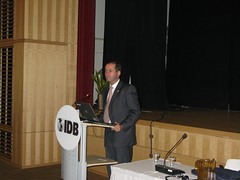
Mr. Spinelli described the preventative actions taken by the CGU unit including:
- Increased Transparency
- Incentive to Social Control
- Management Strengthening
- Implementation of International Conventions
- Improved Legal Framework
- Studies and research on corruption
- Education for Ethics and Citizenship
Mr. Spinelli described the timeline for the creation of the Brazil Transparency Portal. Procurement and budget execution information is available on the portal. Companies found to have engaged in corrupt practices are listed on the portal. Brazil is now moving to support IFRS and IPSAS standards. Full information about public servants are provided on the portal. Full information on the 2014 World Cup and 2016 Olympic games contracts and expenditures are provided.
Mr. Spinelli described how the transparency portal provides easy access without passwords and accessible information. He emphasized that the information and navigation needs to be simple.
The Brazil Transparency Portal has disclosed $4.4T in total amounts since 2005, with over 1 Billion in registered payments with almost 250,000 monthly accesses and over 30,000 paid subscribers to push services.
The Brazil Transparency Portal has won numerous international awards. It takes approximately 4 1/2 hours for daily document updates.
The Transparency Portal in Brazil is compliant with many international standards:
- International Public Sector Accounting Standards
- XBRL
- IMF Good Practices on Fiscal Transparency Code
- OECD Best Transparency Budget Practices
- Open Government;
Mr. Spinelli described the Three Laws of Open Government Data
- If it can’t be spidered or indexed, it doesn’t exist
- If it isn’t available in open and machine readable format, it can’t
engage - If a legal framework doesn’t allow it to be repurposed, it doesn’t empower
- 95% agree that transparency required for social participation and preventing transparency
- 67% agree that citizens have interest in social control and transparency
- 86% agree that citizens can be encouraged to participate in social control transparency
- 74% agree that Transparency portal best way for public sector transparency
According to the web site:
“The Transparency Portal was created in November 2004 for the purpose of making it possible for public managers and citizens at large to follow up on the financial execution of all programs and actions of the Federal Government more easily. The information available in it includes: funds transferred by the Federal Government to states, municipalities and the Federal District; funds directly transferred to citizens; direct spending of the Federal Government with procurement or contracts for projects and services, including the spending of each agency with per diems, office supplies, equipment, projects and services; as well as spending through Payment Cards of the Federal Government.
The Portal shows all data on the SIAFI's (Federal Government Integrated System for Financial Management) financial execution, as well as data provided by the National Health Fund, by Caixa Econômica Federal ( Brazil 's federal savings bank), by the National Treasury Secretariat and by Banco do Brasil . Apart from publishing all these data and information, the Transparency Portal makes a communication channel available: the Talk to Us link. Through this channel, users of the Portal can clear any doubts regarding accessibility or its contents, as well as post congratulations or suggestions.”





